Ali: | Michael, welcome back to Shots eZine. Last time we met you were a guest speaker at Crimescene 2002
|
Michael: | I was. Kind of strange for me, actually, as Iíve been to many, many horror and SF festivals over the years, but no crime ones at all... I did slightly worry that Security would figure me for an imposter and throw me out.
|
Ali: | And I believe youíre speaking at Crimescene 2004 to be held at Londonís NFT (Thursday 8th - Sunday 11th July).
|
Michael: | Yes, Iíve been invited back, but the schedule hasnít been finalised as yet. I believe I have a panel on the Friday.
|
Ali: | So apart from working on The Lonely Dead, can you tell us what youíve been up to since the release of The Straw Men
? |
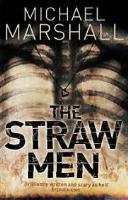 |
Michael: | Writing The Lonely Dead has taken up most of the time. My mother died soon after the publication of The Straw Men, which threw life for a loop for quite a while. I was working on an original horror screenplay for a time after that, but the project ran aground - reinforcing a decision I was already on the verge of making, which was that Iíd pretty much had it with the film and television industry. I wrote a few short stories, spent a certain amount of time staring out of the window (this is listed on my passport as my primary occupation), otherwise, it was writing the novel.
|
Ali: | So how do you feel about the TV/film work?
|
Michael: | With the exception of a couple of quiet projects Iím working on with people I like and trust, Iím leaving the whole thing behind for the time being. Takes up too much time, and provides too much grief. Six of my short stories are under option, and Spares was picked up by Paramount last year, but only time will tell whether anything comes of those.
|
Ali: | Short stories?
|
Michael: | Iíve written a few new ones, mainly for the new collection which came out from Earthling Publications. But my head is primarily in a novel space at the moment, and shorter fiction doesnít pop into my head as often as Iíd like.
|
Ali: | Can you tell us how you became involved with the BBCi web project Vampires? And your story ĎThis is nowí available for download .
|
Michael: | They just emailed and invited me, actually. I warned them that any story I wrote would likely be rather oblique: partly because Iíve written a couple of vampire stories before, and didnít want to rework the same ground, and also because having an environment which is explicitly about vampires gives you the welcome opportunity to not come at the subject straight on. They were cool about that, and Iím pretty happy with the result. Itís a great-looking site, and I love the artwork for my story.
|
Ali: | Your own website has had a bit of a facelift, so can you tell us what involvement you have with www.michaelmarshallsmith.com?
|
Michael: | Iíve been working closely on it with Ariel - the new webmaster. Itís still in construction at the moment, but thereís now very regular news updates, and will very soon be a forum. A good website can provide a genuine community, and Iíd like the site to head more in that direction. Weíre open to suggestions.
|
Ali: | You have worked with Paul Millar of Earthling Publications and have recently won an award for one of your collections. Can you tell us about working with the small press? |
Michael: | My experience with working with the small press has been very good - and especially with Paul. We put together a pretty comprehensive collection of my short stories last year - titled More Tomorrow And Other Stories - and itís just won the International Horror Guild Award for Best Collection, which Iím utterly delighted about. When theyíre run by people like Paul - who has a level of professionalism that most Ďmainstream publishersí can only dream of - the smaller presses can be your best hope for getting a book youíre happy with. Especially when it comes to short fiction, which remains fairly unpopular with larger publishers. Youíve got to be a bit wary, because there are some people out there with more optimism than expertise, but I think the smaller presses are becoming increasingly critical to maintaining the vitality of horror fiction in particular. |
 |
Ali: | Were you worried that your earlier collection by Earthling Cat Stories might get some readers thinking that you were an aficionado of that curious sub-genre of the Ďcozyí the cat-mystery, when in fact your work is very much in the noir-style?
|
Michael: | Well, youíve got to understand that people who love cats really, really, really... like them. We can be pretty bonkers on the subject. I hadnít actually heard of the cat mystery genre, I must admit. Sounds slightly odd, but - to be honest - Iíd rather read a book about a cat than watch a single second of reality television. I guess we all have our own safe spaces.
|
Ali: | So now onto your latest; The Lonely Dead. Can you tell us the genesis?
|
Michael: | Some of it came from extensions of the ideas Iíd been exploring in The Straw Men. Other parts from background reading. From watching webcams of boring street corners. From some mildly whacked-out theories I have about human history. I donít really know where novels come from, actually, they just kind of appear. Eventually. |
 |
Ali: | What made you return to your four main characters - the haunted cop John Zandt, the troubled FBI agent Nina, ex-CIA man Ward Hopkins as well as the man in the shadows - The Upright Man?
|
Michael: | I wanted to spend more time with them, I had ideas about what theyíd be into next, and there were themes I wanted to develop further. Itís the first time Iíve ever done something like that. It was quite a challenge at first, but Iím glad I did it.
|
Ali: | So whatís with the US re-title? |
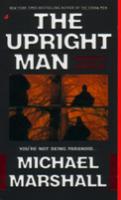 |
Michael: | Well, itís kind of interesting. The US actually had their title first - my agent there, Ralph Vicinanza, suggested it - but it didnít play in the UK. An example of how our two cultures, though they overlap to a huge extent, arenít the same. The phrase Ďupright maní has a more rich connotation in America. It works very well there, but it wouldnít have worked here. Iíd much prefer it if the book was called the same thing all over the world, but thatís life. In a way itís nice that weíre not at that point of cultural homogeneity yet.
|
Ali: | I see the French havenít gone with the US title.
|
Michael: | I suspect it will end up being called The Lonely Dead everywhere except the US, actually. Titles can be surprisingly hard - especially now theyíre almost more relevant to the marketing of a book than to its contents.
|
Ali: | So for our US and French readers, when are they likely to see The Lonely Dead /The Upright Man hit their bookstands?
|
Michael: | Itís already out in the US, and it will be published in France in mid-June.
|
Ali: | For newer readers. Will you have to read The Straw Men before meeting up with The Lonely Dead?
|
Michael: | I donít believe so. Theyíll certainly come armed to the second novel with a little more background if they do so, but the second novel is sufficiently free-standing that itís not mandatory. I discovered the fourth of Joe Lansdaleís Hap & Leonard novels first, and then - mainly by chance - read the others in reverse order, getting to the first one last. This actually gave kind of a cool effect, telescoping back in time... But no, any book needs to stand on its own two feet, so itís not essential.
|
Ali: | And I heard that The Lonely Dead is the second book in a trilogy?
|
Michael: | Thatís correct. Iím writing the third book now. The novels are free-standing in terms of the plot of each, but there are overall themes and background story elements which run as an arc over the three.
|
Ali: | When Ward Hopkins continues his search for his brother who may or may not be The Upright Man, did you worry that his search is strewn with very visceral imagery?
|
Michael: | No. I think when youíre dealing with serious issues - death, for example - you have to make them real. Stop well short of exploitation or voyeurism, of course, but you have to make the events real and give them weight. Death is not a game.
|
Ali: | I also felt the book to be angry and pessimistic toward its outlook at humanity. Is that a fair comment?
|
Michael: | There are certainly aspects of humanity which anger and depress me enormously, but Iím not pessimistic. Weíre a species with great potential for good, and also for evil. The future is in our hands. Yes, we can keep on doing whatever we like and finding easy scapegoats (we blame the terrorists, the terrorists blame us, meanwhile innocents die all over the world) but weíll destroy ourselves in the process. It doesnít matter whoís right if weíre all dead. We have to recognise and accept that badness is inherent to all of us, and try A LOT HARDER to avoid it - rather than always seeking to blame some outside agency, nation or creed.
|
Ali: | So apart from the US and France, has the interest in The Lonely Dead been as international as it was for The Straw Men? |
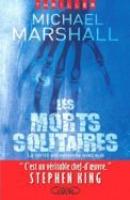 |
Michael: | Very much so. Everyone who took The Straw Men is taking The Lonely Dead, and the first book is still finding new markets. Iím recently back from launching The Straw Men in Italy, and in June will be in Paris promoting Les Morts Solitaires. In between Iíll be in Poland as a guest at a SF festival run by the British Council - still keeping my hand in the futuristic stuff. Iíve been amazed and delighted by the European response to these novels, and in particular how seriously some of the underlying ideas have been taken.
|
Ali: | I really enjoyed the more Ďstrangeí side to your work, and I did feel that you were being even more adventurous in The Lonely Dead than you were in The Straw Men. Would you agree? And do you have any fears vis-ŗ-vis the more traditional crime/mystery fan not Ďgetting ití?
|
Michael: | Yes, I was being a little more adventurous, but one of the things that I love about the thriller/mystery genre is how elastic it is. Writers like John Connolly and James Lee Burke - to name but two - have been using elements of the macabre and super-real (or supernatural, perhaps) into the genre for a while. And if you look further back, some of Jim Thompsonís novels take extremely compelling liberties with consensual Ďrealityí - novels narrated by dead people, or which take swerves into very odd and gothic territories and then refuse to come home again. These books are fifty years old and have helped define the very fabric of the genre: it really shouldnít surprise readers if writers want to do the same kind of thing now. I see crime/mystery as the literary equivalent of the blues. They have the same noir, visceral appeal, and they both explore the endlessly fascinating variations you can derive from a stylised and limited palette (of themes and chord sequences, respectively). There is room for enormous variety in the way we play our crime and mystery and thriller tunes - and thatís something I think we fans of the genre should celebrate and enjoy and remain open-minded about. And if the more traditional people donít like what I do, thatís a shame (for me), but luckily for them thereís a whole bunch of people they do like. Read what you like, try what you donít like every now and then (just in case you might find you do like it after all, and get yourself a whole new realm to explore), and otherwise live and let live. Variety strengthens a genre, rather than weakening it.
|
Ali: | Conversely, how did your traditional SF/Horror readership receive the crime-thriller, The Straw Men?
|
Michael: | So far as I can tell, most of the horror fans came willingly along for the ride. Horror and serial killers are not too far apart. I know some of the SF readers came too, but also that some didnít. Iíve even seen comments about how it isnít even worth trying my new books, because Iíve sold out and joined a Ďmoribund genreí. For every blinkered crime Ďfaní who thinks SF sucks, you see, thereís a rabid SF Ďfaní standing pointing the finger right back. Luckily, thereíre a lot of people in between who donít have these rigid lines drawn. For others, the books are of secondary importance to their own personal agenda. Thatís fine, and their own choice and lifestyle, but as an author you have to try not to care too much about what other people think, especially if you suspect their judgments are based on beliefs or values you donít share.
|
Ali: | What thoughts have your UK publisher and agent about the direction in your writing? Do they worry about it finding a readership; and what pressure do you ultimately feel?
|
Michael: | They donít worry about it finding a readership at the moment: The Straw Men outsold my best-selling previous novel by a factor of eight, and put me on the Sunday Times and New York Times bestseller lists for the first time in my life. May be the only time, of course! They were a little surprised by the side-step initially, but they have mainly been with me since right at the beginning, and soon saw that while a few things had altered, the heart of what I was doing remained the same. Iím still the same guy writing about the kind of things that interest me - all thatís happened is that the arrangements are a little different. I asked the stand-up acoustic bass guy to take a breather, and brought in someone on electric. There may be a harmonica solo later. Weíll see. Of course I feel pressure, and the only response to it I have is this. My job as a writer is to entertain people; my job as a person is to support my family, and not go insane in the process. Writing exactly the same thing time and time again would make me unhappy. Being unhappy is bad. Therefore Iím writing what it occurs to me to write, and just hoping that the results entertain people. Anything more than that is out of my hands.
|
Ali: | What books have interested you since we last spoke?
|
Michael: |
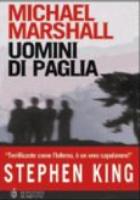
Been a good few months for books, actually. I recently finished The Hundredth Man, by Jack Kerley; Harper UK sent me an advance copy and I enjoyed it enormously. Before that it was The Devil In The White City by Erik Larson, a fascinating non-fiction account of the concurrent organizing of the Chicago Worlds Fair in 1893, and the work of one of Americaís first serial killers. Then there was Love Me, by Garrison Keillor - Iíve always loved his prose, and this new novel is touching, profound and very, very funny. Odd Thomas, by Dean Koontz: Iíve tried a few of his books in the past, and not been able to get on with them - but this one was a real eye-opener. Superb. Then a couple of Dominick Donneís collections of Vanity Fair trial reportage. And Carter Beats The Devil by Glen David Gold, John Connellyís Bad Men, Franzenís The Corrections, I re-read Thomas Pynchonís Vineland and liked it even moreÖlots of very good stuff. I have now officially run out of bookshelf space.
|
Ali: | In the future noir camp; Iíve recently enjoyed Richard Morgan and Paul McAuley - especially their respective novels Market Forces and White Devils. Have you read their work?
|
Michael: | I havenít read Morganís yet, but I read McAuleyís and thought it was absolutely stunning. Quite simply one of the best thrillers Iíve read in a long, long time. He takes the future noir genre and gives it the upgrade itís long needed in terms of strength of story and depth of character.
|
Ali: | And films youíve seen?
|
Michael: | Havenít seen much thatís struck me, recently. Think itís been one of those years when Iíve done more reading than watching. I liked ĎIdentityí more than most people did. It wasnít hard to guess what was going on, but it was a nice idea, and not badly done. I loved the feeling of genre cross-over, too. Wish there was more of that kind of thing around. I enjoyed ĎAdaptationí, and laughed hollowly throughout. Quite liked ĎDonnie Darkoí, though it didnít absolutely hit the spot. Havenít seen a good horror film in a long time.
|
Ali: | From the mainstream, what are your thoughts of ĎThe Matrix Trilogyí?
|
Michael: | Um... havenít seen the last two yet. I re-watched the first in preparation for going to see the second, and was reminded of how - once youíd got the Gnostic idea (which was no great revelation to Philip K. Dick fans), and admired the cool look - there wasnít a lot of substance. Didnít get around to seeing the second after that. I will watch them, but am not in any great hurry.
|
Ali: | From the arthouse, have you seen Vincenzo Nataliís ĎCubeí, and his recent work ĎCypherí?
|
Michael: | Both on my list, but havenít seen them yet.
|
Ali: | So what is reality in your opinion?
|
Michael: | That I have a deadline... and that in fifty years Iíll be dead.
|
Ali: | Do you have a message for your readers out there?
|
Michael: | Try not to worry about whatever youíre worrying about.
|
Ali: | Michael, thank you for your time and good luck with The Lonely Dead.
|
Michael: | A pleasure, as always!
|


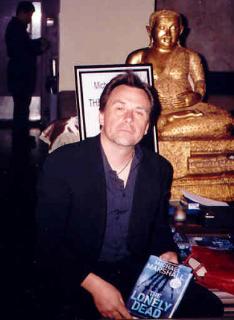 2002 was a defining year for Michael Marshall Smith, the award-winning SF/Horror writer: his name became truncated and he published the runaway bestseller The Straw Men. This novel drew upon a strange theory about our evolution and then explored a linkage to the operation of a serial-killing group - The Straw Men, who were linked to an even greater terror controlling their movements like a puppet-master. This man in the darkness was called The Upright Man.
2002 was a defining year for Michael Marshall Smith, the award-winning SF/Horror writer: his name became truncated and he published the runaway bestseller The Straw Men. This novel drew upon a strange theory about our evolution and then explored a linkage to the operation of a serial-killing group - The Straw Men, who were linked to an even greater terror controlling their movements like a puppet-master. This man in the darkness was called The Upright Man.






